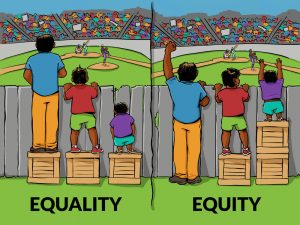Last Sunday, I joined the IFP(Initiative For Peace) conference in UWC Dover campus. It was an amazing experience.
The conference was all designed by UWC students and was divided into 4 sessions: discrimination, violence, identity, and media.
After a series of ice-breaking games, we started from discrimination session. Here, we discussed the definition of discrimination, types of discrimination and why people tend to discriminate others. We also played some games in order to let us have a better understanding of discrimination. We also talked about potential solutions of discrimination which were equality and equity. Equality is everyone gets the same whereas equity is to be fair, to decide who should get more based on different people’s different situation.
In order to achieve positive peace, we should pursue equity. However, equity is not something that can be achieved quickly. So governments should build equity based on equality.
The second session was violence. We started by a simple game which demonstrates us different roles in violence. All the students were divided into two groups. One group needed to use chairs to make a barrier in order to stop the other group from reaching to the other end of the classroom. Half of the students in the other group were blinded by blindfolds and the other half needed to guide them to cross the barrier. But the barrier group members can say something wrong to deliberately guide them to the wrong direction. In addition, 3 students in the barrier group were asked to be bystanders, that is, they can only watch in silence.
I was assigned to the group which was required to build barriers. Students in my group were so excited when they tried to block the other group of students. I think it is a kind of human nature to gloat, to feel kind of “funny” when others are in little troubles. This also applies to those bullies who want to “make some fun” and show that they are superior. One thing I may never forget is when a boy tried to lift a chair and cross the barrier, a girl who was acting the role of bystander in my group started to yell at me:”say something!” I suddenly felt lots of pressure and started to misguide the boy to the wrong direction and soon I got the hang of it and kept doing it. This makes me realize that in reality, lots of people are kind of “forced” to become a bully. “If you don’t join us, then you will be the one be bullied.” This is a complex situation, maybe at the first place people choose to join because they have “no choice”. But once they become one of those evils, they will be corrupted soon. Education is not only about the academic study but love and peace as well. Before we know how to solve a maths question, we must learn how to treat others, how to love others and how to be a decent man. We should build a positive value and stick on it. As a peace-builder, it is our commitment to stay impartial and kind to the world.
I like the topic “identity” because I am always proud of my identity as a Chinese, as a girl, as a dog lover, as “me”. We learned to respect other’s identities and other’s life choices. No matter what gender we choose to have; no matter what religion we choose to believe, at the end of the day, we are all humans. Everyone has their right to choose their own interests and preferences, we should fully respect other’s choices.
Last but not the least, we had a lesson about media bias and fake news. We read some fake news and posts on Facebook. These news really affect other people’s lives and have negative impacts on our society. In addition, biased news twist people’s thoughts and values, which may lead to the downfall of a whole generation.
After we finished our learning sessions. We sang and danced all together in the conference room. There was also some performances given by students. I really appreciate those seniors who worked so hard to make this conference a big success. I did learn a lot about peacebuilding from the conference and made lots of new friends from all over the world.








